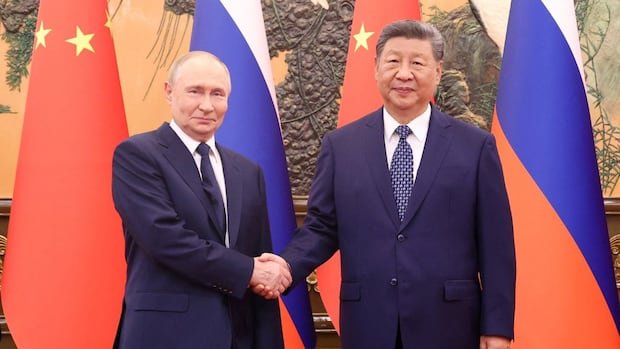China’s massive military parade on Wednesday was an attempt to position itself as the leader of a new emerging international order as the United States is losing allies, experts told CBC News.
The parade, the biggest in the country’s modern history, showcased powerful high-tech weaponry as Beijing marked 80 years since Japan’s defeat at the end of the Second World War. It followed a multi-day diplomatic summit, which saw Chinese President Xi Jinping meet with world leaders over the weekend.
Xi was flanked by Russian President Vladimir Putin and North Korea’s Kim Jong-un, the first North Korean leader to attend a Chinese military event in 66 years.
All three leaders are largely shunned by the West.
Vina Nadjibulla, vice-president of research and strategy with the Vancouver-based Asia Pacific Foundation, says the heavily choreographed events of the past week are positioning China at the centre of an “alternative world order” while the U.S. is dismantling the order that was put in place after the Second World War.
“I think China is now again taking advantage of the fact that the U.S. is destroying its own relationships with its allies,” she said.
China put its military might on display Wednesday with a large parade. Also on display was China’s Xi Jinping flanked by Russia’s Vladimir Putin and North Korea’s Kim Jong-un, a group of leaders united in a desire to challenge the dominance of the United States.
Nadjibulla says the shift is already underway.
At the summit, Xi called for unity against “hegemonism and power politics” — a remark seen as a thinly veiled swipe at the U.S. and Trump’s sweeping tariffs.
Putin closed deeper energy deals with China, while the gathering was seen, by observers, as giving Kim a chance to gain implicit support for his nuclear weapons program.
Nadjibulla says the showcase won’t likely change hearts and minds in the West, but could have an impact in Africa, Latin America and Southeast Asia, where China in particular has worked to build diplomatic bridges.
She says the lavish event also sends a signal that China is not afraid of the U.S.
Some of the weapons and military units were being displayed for the first time, such as lasers, nuclear ballistic missiles and giant underwater drones. Helicopters and warplanes flew in formation during the 70-minute parade.
“The message was China is not afraid of violence, that China is independent, and basically the choice is for the U.S. to choose war or peace — but China is prepared to deal with either eventuality because it’s strong,” Nadjibulla said.
‘Humiliating’ for Trump
Aurel Braun, a professor of international relations and political science at the University of Toronto, says China is attempting to “make the international system America-proof.”
“In every respect, we have a China signaling that they intend to be the premiere world power, and that those who want to be on the side of what their version is of progress should align themselves with China, not with United States,” he said.
Braun says the show of power sends a frightening and destabilizing message to Taiwan, around which China has launched military drills in recent months, as well as surrounding countries like Japan, the Philippines and Vietnam.
For U.S. President Donald Trump, he said spectacle was “humiliating.”
China’s President Xi Jinping welcomed the leaders of Russia, Iran and North Korea in Beijing ahead of a military parade to mark the end of the Second World War. Cold War historian Sergey Radchenko says that while Xi and Russian President Vladimir Putin are renewing their ties, it should not impact the relationship between Putin and U.S. President Donald Trump.
Trump initially told reporters he did not see the parade as a challenge to the U.S., saying he has a “very good relationship” with Xi.
But in a post on social media site Truth Social later, he touted the U.S. role in helping China secure its freedom from Japan in the Second World War.
“May President Xi and the wonderful people of China have a great and lasting day of celebration. Please give my warmest regards to Vladimir Putin, and Kim Jong Un, as you conspire against The United States of America,” Trump posted.
Braun said Chinese media has pointed out how “pathetic” Trump’s June military parade in Washington, D.C., was by comparison.
But the bigger embarrassment, he says, is Putin’s apparent closeness with Xi, after Trump’s many attempts to curry favour with the Russian president, including a recent summit in Alaska where Trump failed to close a ceasefire deal in the Ukraine war.
Braun compares Trump to Charlie Brown in the Peanuts cartoons, attempting repeatedly to kick a football held by his friend Lucy, who always pulls it away at the last minute.
“That’s what Vladimir Putin is doing to Trump. He always takes away the football,” he said.
“This idea that Trump could somehow detach Vladimir Putin from China was delusional, and it has been starkly rebuked.”
University of Chicago political science professor Dali Yang said Xi sharing a podium with Kim and Putin was “striking,” but noted Xi is still emphasizing the importance of international organizations like the United Nations and the World Trade Organization.
Rather than upending the world order, he said Xi wants to maintain the status quo that has “worked extraordinarily well for China,” but simply put his country in a more prominent role.
He noted many countries are still uneasy with China’s growing economic and military power, and even Russia and North Korea have expressed wariness, despite their alliances.
“A lot of the goodwill China is gaining is because of not what China is doing now, but what other countries are coping with — namely the tariff wars being launched in Washington,” Yali said.

